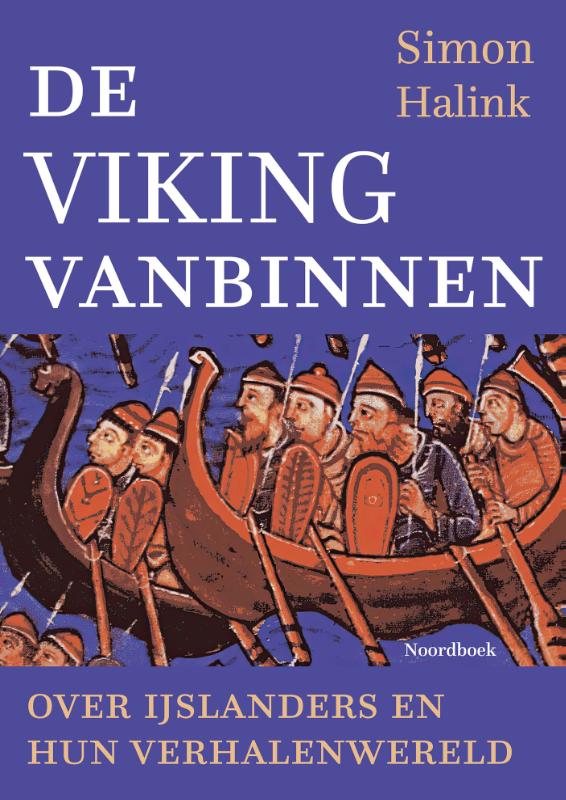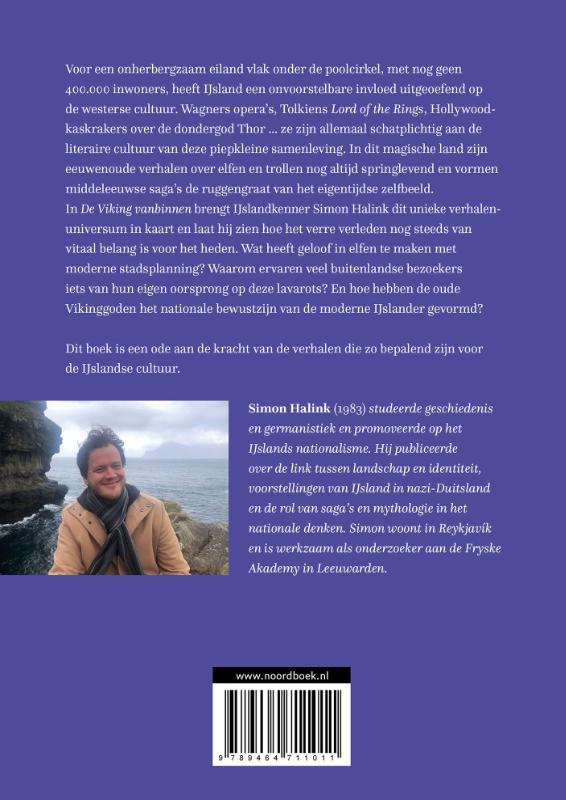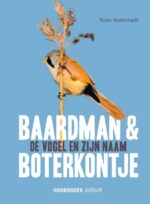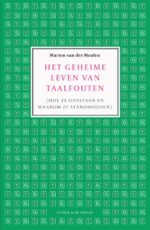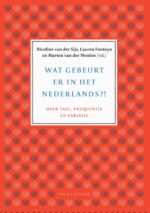De Viking vanbinnen
€ 29,90
Voor een onherbergzaam eiland vlak onder de poolcirkel, met nog geen 400.000 inwoners, heeft IJsland een onvoorstelbare invloed uitgeoefend op de westerse cultuur. Wagners opera’s, Tolkiens Lord of the Rings, Hollywood-kaskrakers over de dondergod Thor … ze zijn allemaal schatplichtig aan de literaire cultuur van deze piepkleine samenleving. In dit magische land zijn eeuwenoude verhalen over elfen en trollen nog altijd springlevend en vormen middeleeuwse saga’s de ruggengraat van het eigentijdse zelfbeeld.
In De Viking vanbinnen brengt IJslandkenner Simon Halink dit unieke verhalen-universum in kaart en laat hij zien hoe het verre verleden nog steeds van vitaal belang is voor het heden. Wat heeft geloof in elfen te maken met moderne stadsplanning? Waarom ervaren veel buitenlandse bezoekers iets van hun eigen oorsprong op deze lavarots? En hoe hebben de oude Vikinggoden het nationale bewustzijn van de moderne IJslander gevormd?
Dit boek is een ode aan de kracht van de verhalen die zo bepalend zijn voor de IJslandse cultuur.
Simon Halink (1983) studeerde geschiedenis en germanistiek en promoveerde op het IJslands nationalisme. Hij publiceerde over de link tussen landschap en identiteit, voorstellingen van IJsland in nazi-Duitsland en de rol van saga’s en mythologie in het nationale denken. Simon woont in Reykjavík en is werkzaam als onderzoeker aan de Fryske Akademy in Leeuwarden.
Gerelateerde boeken
-
Baardman en boterkontje
€ 22,90Heet de fuut fuut omdat ie ‘fuut’ roept? Houdt de ijsvogel van ijs en kan de putter putten?
Dit soort vragen houdt vogelliefhebbers en taalliefhebbers bezig. In dit boek verklaart Toine Andernach in informatieve en soms hilarische verhalen de herkomst van raadselachtige vogelnamen voor voor vogel- en taalliefhebbers en verweeft die met zijn persoonlijke ervaringen. De verhalen zijn voorzien van prachtige 18de en 19de-eeuwse prenten en bijzondere foto’s.Toine Andernach is een enthousiaste vogelaar met passie voor taal. Of moeten we zeggen een taalkundige met passie voor vogels?
-
-
Voorjaarstradities in Drenthe
€ 29,95Het zonlicht glijdt over een kaal landschap. De dagen worden langzaam langer, de zon warmer en de natuur weer groen: de winter maakt plaats voor de lente. Een periode die sinds oudsher wordt geassocieerd met vruchtbaarheid, wedergeboorte en een nieuw begin. Een periode die rijk is aan gebruiken en tradities om dit te vieren.
Drenthe heeft een groot aantal tradities voor het toejuichen en verwelkomen van de lente. Sommige daarvan kennen we nu nog, zoals het Paasvuur, anderen zijn in vergetelheid geraakt; wie weet tegenwoordig bijvoorbeeld nog wat een Pinksterbroed is of kan nog een hupholt fluitje maken?
In Voorjaarstradities in Drenthe maak je kennis met oude en nieuwe gebruiken in de periode van Sint-Pieter (22 februari) tot en met Pinksteren. Het boek geeft een gevarieerd beeld van hoe men vroeger en nu het voorjaar beleeft, op een informatieve en toegankelijke manier, rijk aangevuld met beeldmateriaal. Het laat zien hoe tradities zijn veranderd, verdwenen en nieuwe zijn ontstaan.
Ook is er ruim aandacht voor de Drentse taal. Er wordt ingezoomd op Drentse woorden die specifiek zijn voor deze periode en de informatieve onderwerpen worden afgewisseld met Drentstalige gedichten en verhalen. Ook geschikt voor lezers die de Drentse taal niet bijzonder machtig zijn.
-
Wat gebeurt er in het Nederlands?
€ 24,95Wat betekent het als een woord, zin of uitspraak vaak voorkomt, of juist bijna nooit? Deze ogenschijnlijk simpele vraag is het uitgangspunt voor een grote verscheidenheid aan bijdragen, die kijken naar de Nederlandse taal in al zijn rijkdom. Taal vroeger, taal nu, en de veranderingen die plaatsvonden. Over uitspraak en grammatica, over meta foren, uitdrukkingen en nog veel meer, vertellen 60 neer landici uit Nederland, Vlaanderen en Suriname. Nicoline van der Sijs is als senior-onderzoeker verbonden aan het Instituut voor de Nederlandse Taal en als hoogleraar historische taalkunde van het Nederlands aan de Radboud Universiteit. Lauren Fonteyn is verbonden aan de Universiteit Leiden als onderzoeker en docent (toegepaste) taalkunde. Marten van der Meulen promoveert aan de Radboud Universiteit en schrijft, spreekt en blogt over taal voor ieder publiek.
